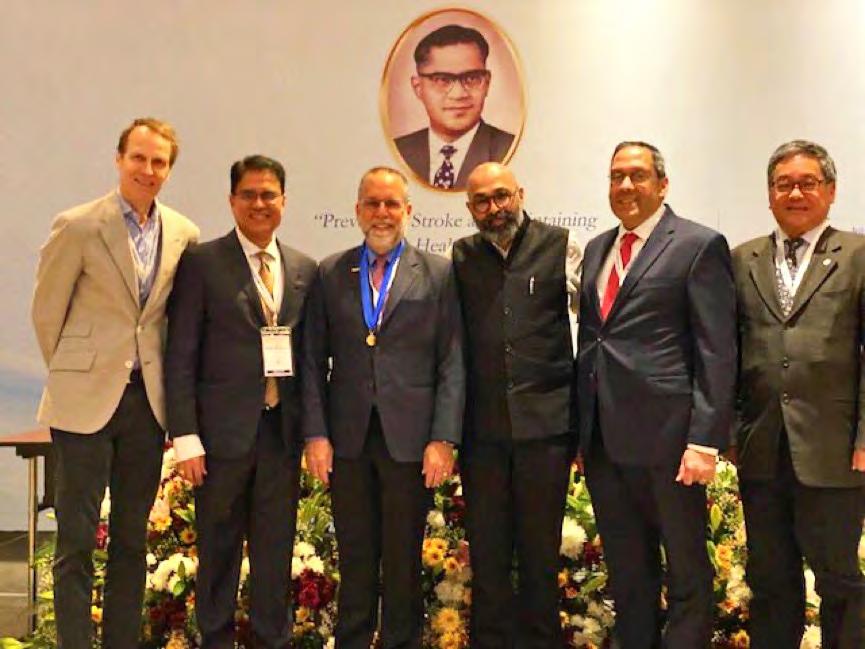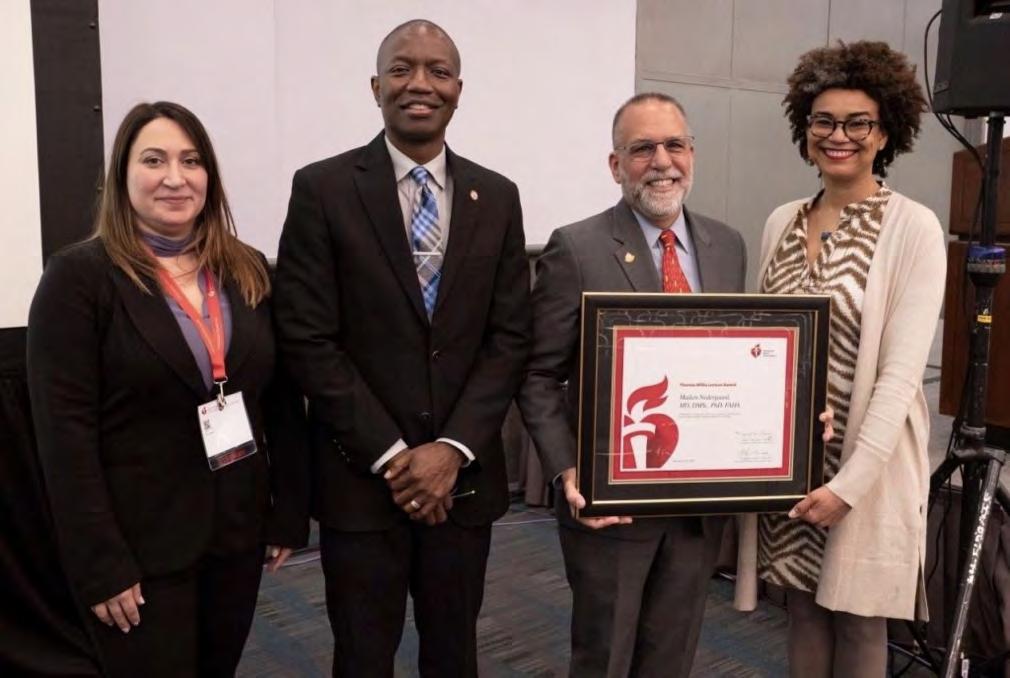
6 minute read
Presentations at Meetings
6. Trainees
Our McKnight Brain Institute received funds in 2020 to support an Evelyn F. McKnight Neurocognitive Scholar. After a competitive search, Dr. Christian Agudelo, MD was selected to be the first Evelyn F. McKnight Neurocognitive Scholar. He joined our MBI in July 2020. He is a trained neurologist who has completed a sleep fellowship at UM. His interest is to investigate sleep as an important and modifiable factor for sustained cognitive resilience and brain health. He has had very productive 6 months of his scholarship. One of the scientific achievements is his manuscript on sleep and cognition that was accepted for publication in the journal Alzheimer’s and Dementia (impact factor 17). He has started to establish his national scientific and professional reputation by being invited to review manuscripts in peer-reviewed journals (he has reviewed 3 manuscripts since August 2020). He has submitted an application for the NIH Loan Repayment Program award that provides up to $50,000 per year to pay for educational debt. A separate report highlighting Dr. Agudelo’s work is provided in Appendix III.
Sarah Getz, PhD was awarded an AAN McKnight Clinical Translational Research Scholarship in Cognitive Aging and Age-Related Memory Loss for her research project “Uncovering Risk Profiles of Deception and Mitigating Susceptibility to Scamming in Midlife and Older Age: A Novel Intervention Tool” in 2020. She has started her service as a member of the Women in Academic Medicine Scholarship Committee at the University of Miami Miller School of Medicine.
Sonya Kaur, PhD had some notable achievements in 2020. She was chosen for the inaugural Sleep Research Program for Advancing Careers Program (SOAR) of the American Academy of Sleep Medicine Foundation. The goal of the program is to launch the research careers of sleep investigators by teaching skills and resources necessary to successfully apply for NIH grants or equivalent grants. She also submitted a grant proposal titled “The Role of Polygenic Risk in Short Sleep Duration and Cognitive Aging” for an AAN McKnight Clinical Translational Research Scholarship in Cognitive Aging and Age-Related Memory Loss in 2020. The outcome of this application is pending the AAN announcement of funded scholars. She has a manuscript accepted for publication in the journal Alzheimer’s and Dementia entitled “Differential pathways by age and sex for the association between combined sleep disordered breathing and sleep duration with neurocognitive decline in Hispanic/Latino adults: the Hispanic Community Health Study/Study of Latinos (HCHS/SOL).”
Most Important Scientific Achievement This Year
This year we highlight Dr. Sacco’s nomination and selection to be the inaugural speaker at the Edward J. Kenton Lecture during the 2020 International Stroke Conference: Pre-Conference Symposium III: HEADS-UP: Health Equity and Actionable Disparities in Stroke: Understanding and Problem-Solving. (Photo below) Dr. Sacco’s presentation featured multiple years of research and contributions to the improvement of stroke care disparities from the Northern Manhattan Study (NOMAS) and the Florida Stroke Registry. The important conclusion of his presentation was the need to move from “Observations to Actions” that created a movement for action to reduce health disparities.

In addition, we highlight the following: • The interdisciplinary team science projects created through NOMAS led by Dr. Sacco: These projects have not only contributed to the scholarly literature on stroke, cognitive decline and health disparities (over 300 publications), but also have had an important influence on evidence-based prevention guidelines that directly benefit society. With current 28 years of
NOMAS existence; a long list of collaborators including talented junior faculty and staff; and the most important contributors of all, the 3,497 NOMAS participants living in Northern
Manhattan, continue to provide important scientific knowledge on risk of stroke and cognitive decline in an aging, urban multi-ethnic community.
• Our team lead by Dr. Sacco established the Florida Stroke Registry (FSR), a large collaboration of 126 Florida hospitals. The FSR is funded by the FL Department of Health and all hospitals treating stroke in Florida are mandated by law to collect and contribute data to FSR. FSR has identified numerous disparities in delivery of systems of care and currently aims to positively impact stroke systems of care. FSR is more than a registry. It has been developing intervention programs while creating actionable dashboards of hospital performance and outcomes as well as educational interventions. Our FSR may serve as a future model for health systems of care in other states.
• Of our published studies in 2020 we highlight the following findings:
- The detrimental effect of mid-life obesity, particularly abdominal adiposity, on cognitive impairment and decline in J Alzheimers Dis 2020;78(4):1653-60 (senior author Dr. Sacco);
- A novel genetic finding of taste transduction pathway (TASR50 gene) in atherosclerosis and potentially in vascular cognitive impairment in Stroke 2020;51(9):2761-9 (senior author Dr. Rundek); and
- A finding that structural brain MRI markers may be more useful for etiological than predictive modeling of cognitive decline using machine learning-based estimation of cognitive performance and regional brain MRI markers in Brain Imaging Behav 2020 doi: 10.1007/s11682-020-00325-3 (senior author Dr. Rundek).
Publications
See Appendix IV.

Presentations at Meetings
1. Scientific Meetings
• Sacco RL. Neurology “Update & Stroke Intensive, Quality Improvement in Acute Stroke
Care in Florida” – The Stroke Registry, Miami, FL, January 18, 2020.
• Wang J, Chen Q, Hernandez J, Delgado S, Jiang H. “Retinal Microstructure in Patients with
Multiple Sclerosis: 2-year Follow-up.” ACTRIM Feb. 2020, poster.
• Saravanan S, Furones CF, Zhao WZ, Dave KR, Perez-Pinzon MA, Raval AP. “Post-stroke physical exercise improves cognition in middle-aged female rats.” International Stroke
Conference February 2020 at Los Angeles, Feb. 2020, refereed abstract.
• Raval A. “Physical Exercise and cognitive recovery in animal models: sex differences.
BHT5. Cognitive Decline in Women” (a Go Red for Women Session), International Stroke
Conference February 2020 at Los Angeles (Poster).
• Watanabe M, Nishimura K, Bellio M, Khan A, Hare JM, Perez-Pinzon M, Raval A, Yavagal
“DR. Maximum Tolerated Dose of Exosomes Derived from Mesenchymal Stem Cells via
Intra-Arterial Dosing in a Rat Stroke Model.” International Stroke Conference 2020 (February 2020) held at Los Angeles, CA. Abstract # WP158. Abstract was refereed.
• Rehni AK, Cho S, Navarro Quero H, Koch S, Ahn YS, Perez-Pinzon MA, Jy W, Dave KR.
“Therapeutic Window of Red Cell Microparticles in Limiting Hematoma Growth in a Rat
Model of Intracerebral Hemorrhage.” International Stroke Conference 2020 (February 2020) held at Los Angeles, C. Abstract # WP407. Abstract was refereed.
• Sacco RL. “Preventing Stroke & Maintaining Brain Health in 2020.” The 40th TS Srinivasan
Oration & Symposium, Bengaluru, India, February 9, 2020.
• Rice J, McInerney K, Aronova Y, Bradley J, Canton-Rodriguez A, Grajeda M, Perez A, Shack
D, Van Deusen K, Cabral D, Rundek T, Gomes-Osman J. “Effect of 4-Weeks of Aerobic
Exercise on Neuroplasticity and Executive Function: A Case Series.” Combined Sections
Meeting American Physical Therapy Association. Poster February 12-15 2020. Washington,
DC.
• Asdaghi N, Wang K, Mueller-Kronast N, Gardener HE, Gutierrez CM, Lee Lau H, Saini V,
Marulanda-Londoño E, Koch S, Krementz N, Dong C, Hanel R, Mehta B, Nobo U, Zevallos
JC, Rundek T, Yavagal DR, Sacco RL, Romano JG. “Outcomes of Endovascular
Thrombectomy in Late-presenting Patients: Findings From the Florida Stroke Registry.”
Poster Presentation International Stroke Conference 2020, Los Angeles, CA, February 18, 2020.
• Bustillo A, Wang K, Gardener H, Gutierrez CM, Sur N, Asdaghi N, Romano JG, Rundek T, Sacco RL, Koch S. “Race-Ethnic and Sex-Related Disparities in Subarachnoid Hemorrhage







